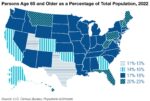2023 ACL Profile of Older Americans: A Look at Demographics, Finances, and More
The American population is getting older, and a new report sheds light on this growing trend. The Administration for Community Living (ACL) recently released the 2023 Profile of Older Americans, a comprehensive look at the demographics, living situations, and economic status of adults 65 and over. The report at a glance… Demographics: As of 2022,…
Read More2023 OHA Pocket Guide: Resource Guide for Older Adults and Adults with Disabilities.
For the first time in recorded history, there are more people over age 64 in the world than children under five. In Rhode Island, over 31 percent of residents are age 55 or older, compared to 28 percent nationally. By 2030, it is estimated that one in four Rhode Islanders will be 65 or older,…
Read MoreBetter Care for Older Adults: New CMS Initiative Promotes Age-Friendly Hospitals
Age-friendly hospitals are crucial for ensuring older adults receive the best possible care during their stay. These hospitals implement practices that take into account the specific needs of elderly patients, such as: Understanding patient goals and preferences: Care should be tailored to individual needs and what matters most to the patient. Medication management: Medications should…
Read MoreThe Importance of Integrated, Age-Friendly Care for Older Adults’ Mental Health
20% of older adults have a mental health diagnosis, yet they underutilize vital behavioral health services. That’s why integrated, age-friendly care is CRUCIAL! No more silos separating physical and mental healthcare. Read more in a recent Gerontological Society of America paper. As we observe Mental Health Awareness Month and Older Americans Month, it’s crucial…
Read MoreREMINDER: Register for info session on equity in aging and 2025 grantmaking
In this webinar, Point32Health Foundation will share its progress in creating a more equitable future for older adults. Learn how they are partnering with communities to address the root causes of health disparities and dismantle systemic barriers. Date: Thursday, May 30 Time: 1 – 2:30 p.m. Location: Virtual Why focus on equity in aging? During…
Read MoreHousing & Support Grants Available! Apply Now for RICoC Funding
The Rhode Island Continuum of Care is requesting proposal(s) from qualified nonprofit organizations and/or local government agencies for new project applications for the 2024 Continuum of Care Program Competition. The CoC seeks projects that can make maximum efficient, economical, and effective use of the prospective allocation of the United States Department of Housing and Urban…
Read MoreAgeism: The Hidden Threat to Mental Wellbeing in Older Adults
A growing body of research reveals a disturbing trend: ageism, discrimination based on age, can have a profound negative effect on the mental wellbeing of older adults. The article “The Impact of Ageism on Elders’ Mental Health” by Tracey Gendron, for SA Generations dives deep into this issue. They cite studies showing a clear link…
Read MoreCelebrating Older Americans Month: Powered by Connection
Established in 1963, Older Americans Month (OAM) is celebrated every May. Led by a federal agency, the Administration for Community Living (ACL), OAM is a time to recognize older Americans’ contributions, highlight aging trends, and reaffirm commitments to serving the older adults in our communities. This year’s theme, “Powered by Connection,” focuses on the profound…
Read MoreNADTC Transportation Grant Opportunity for Rural Communities!
The National Aging and Disability Transportation Center recently announced a new community grant opportunity, the 2024 Rural Community Innovations Transportation Planning Grant. Here’s a brief rundown of the details Agencies can apply for up to $35,000 to engage in planning activities to identify transportation barriers, consider current and future community needs, and create or strengthen multi-sector collaborative partnerships.…
Read MoreRhode Island Goes Big on Local Parks and Rec Upgrades
The State of Rhode Island is dedicating significant funding to enhance local recreation amenities across municipalities. Governor McKee and the Department of Environmental Management recently allocated $2 million in matching grants to 11 cities and towns. These funds will allow communities to construct new facilities like playgrounds, pickleball courts, dog parks, splash pads, and trails,…
Read More
